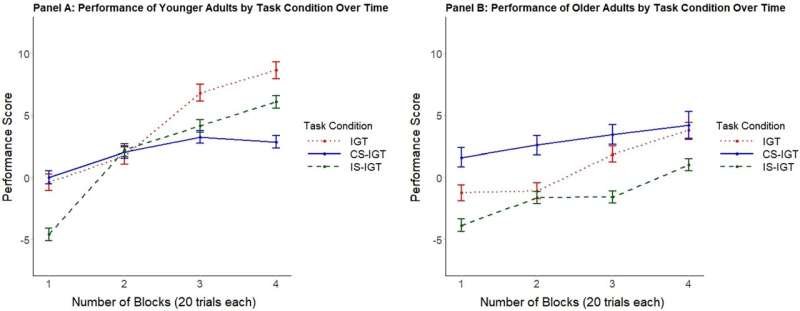This article has been reviewed according to Science X's editorial process and policies. Editors have highlighted the following attributes while ensuring the content's credibility:
fact-checked
trusted source
proofread
Older adults rely more on trust in decision-making. It could open them up to scams

Each year, older adults lose more than $28 billion to financial scams targeting the elderly. Nearly three-quarters of that money is stolen by people the elderly adult knows—people they trust.
According to new research, this vulnerability may be in part because older adults have a harder time overcoming their first impressions of people's trustworthiness when that trust is violated, potentially leaving them more open to deception and scams on older adults.
The researchers say elderly adults should be wary of their first impressions. Instead, they should focus on whether or not someone is acting in a way that really earns their trust or is instead harming them.
"We make these decisions about trustworthiness in a split second sometimes, and that is an unreliable way to make good decisions in the long term," said Marilyn Horta, Ph.D., a University of Florida research scientist and first author of the new study. "All of us, especially older adults, we need to really pay attention to how a person behaves rather than our initial perceptions of whether they look trustworthy or not."
Horta, UF Professor of Psychology Natalie Ebner, Ph.D., and their collaborators published their findings in January in the journal Scientific Reports.
The new study on the psychology of trust and decision-maker was based on a simple gambling game where people must choose from a deck of cards that can gain or lose points with each card draw. The more points they get, the more money they can make. But the decks are stacked. Some will lure you in with big payouts followed by even bigger losses, while the winning decks offer modest but more predictable gains.
These decks were paired with pictures of faces, some of which were rated trustworthy, and others were considered untrustworthy.
The majority of both younger and older adults initially opted to choose cards represented by trustworthy faces. But when they started losing with the supposedly trustworthy cards, younger adults were much quicker to learn and tried switching to another deck of cards in hopes of stemming their losses.
It took elderly adults most of the game before they started performing well, as they seemingly favored their first impressions of trust, which obscured that the cards were bad. The younger group had an average age in their early 20s, while the older cohort averaged between 70 and 75 years old.
"Often fraud happens through family members. If family members start acting untrustworthy, older adults are potentially not picking up on that change in behavior as well," Ebner said. "They're not adjusting to the new situation as much."
"One advantage we have in older age is the accumulation of life experience. But there might be situations where relying on previous experiences pushes us in the wrong direction, and we make the wrong decision," she added. "We have to stay aware even if we think we know who we can trust."
More information: Marilyn Horta et al, Age-group differences in trust-related decision-making and learning, Scientific Reports (2024). DOI: 10.1038/s41598-023-50500-x



















